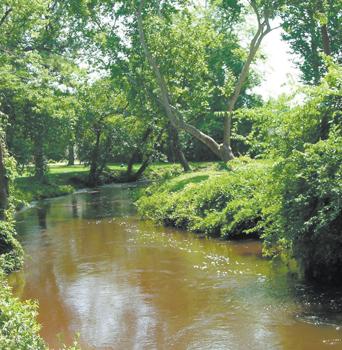 The city of Fayetteville stormwater program is expected to take giant steps forward in the years ahead in efforts to control stormwater runoff, prevent flooding and address citywide stormwater issues. The adoption this fiscal year by city council of a significant increase in the stormwater fee will allow for development of a master plan.
The city of Fayetteville stormwater program is expected to take giant steps forward in the years ahead in efforts to control stormwater runoff, prevent flooding and address citywide stormwater issues. The adoption this fiscal year by city council of a significant increase in the stormwater fee will allow for development of a master plan.
The city has experienced predictable localized flooding and stormwater runoff for decades with no plan to reduce or eliminate it. The stormwater fee increase is expected to raise approximately $3.2 million yearly to be set aside for the capital portion of the stormwater program. Over the firstfive years, the revenue will pay for completion of watershed studies and development of a master plan. The city currently spends nearly $3 million annually on both design and construction for stormwater capital improvements, and that amount will double once the studies are completed.
With passage of this fiscal year’s municipal budget, the city’s stormwater program is being accelerated so that a dozen watershed studies that could individually take up to two years can all be completed within five years. “We’re paralyzed until we get these studies done,” city Councilman Jim Arp said.
City officials over the years have examined and reviewed stormwater problems and how to fix them. But recent hurricanes have prompted the administration and elected officials to concentrate on the fix.
Officials contend that getting things done is based on capacity to do so, which usually means money. “The city is very forward thinking in its management of new growth and associated stormwater impacts,” said Assistant City Engineer John Lurch II. Fayetteville was recently recognized as the most innovative city in the country for its use of data analysis to guide decision-making, management and long-term planning.
“The city’s stormwater ordinance is an attempt to balance the development rights of upstream property owners with the rights of those downstream ... without creating or worsening flooding problems,” said city Engineer Giselle Rodriguez. At her request, city council last week agreed to add $223,000 annually to the engineering division’s payroll to hire three additional professionals to enhance the review process for new housing developments.
Improvement of the city’s 15 watersheds is an extremely expensive undertaking. “The day of reckoning” is at hand, said city councilman Bill Crisp. “Millions and millions of dollars will be needed.” In an article for American Infrastructure, an industry periodical, Lurch wrote that “the city may need over $200 million in stormwater capital to design and build the projects that are uncovered through the study.”
City council members seem to agree that, ultimately, a revenue bond proposal may be put to a vote of the people to fund future stormwater needs. It would be the largest effort ever undertaken by the city stormwater program and promises to create a long-term plan for the development of the stormwater utility.

 How to resolve AdBlock issue?
How to resolve AdBlock issue? 








